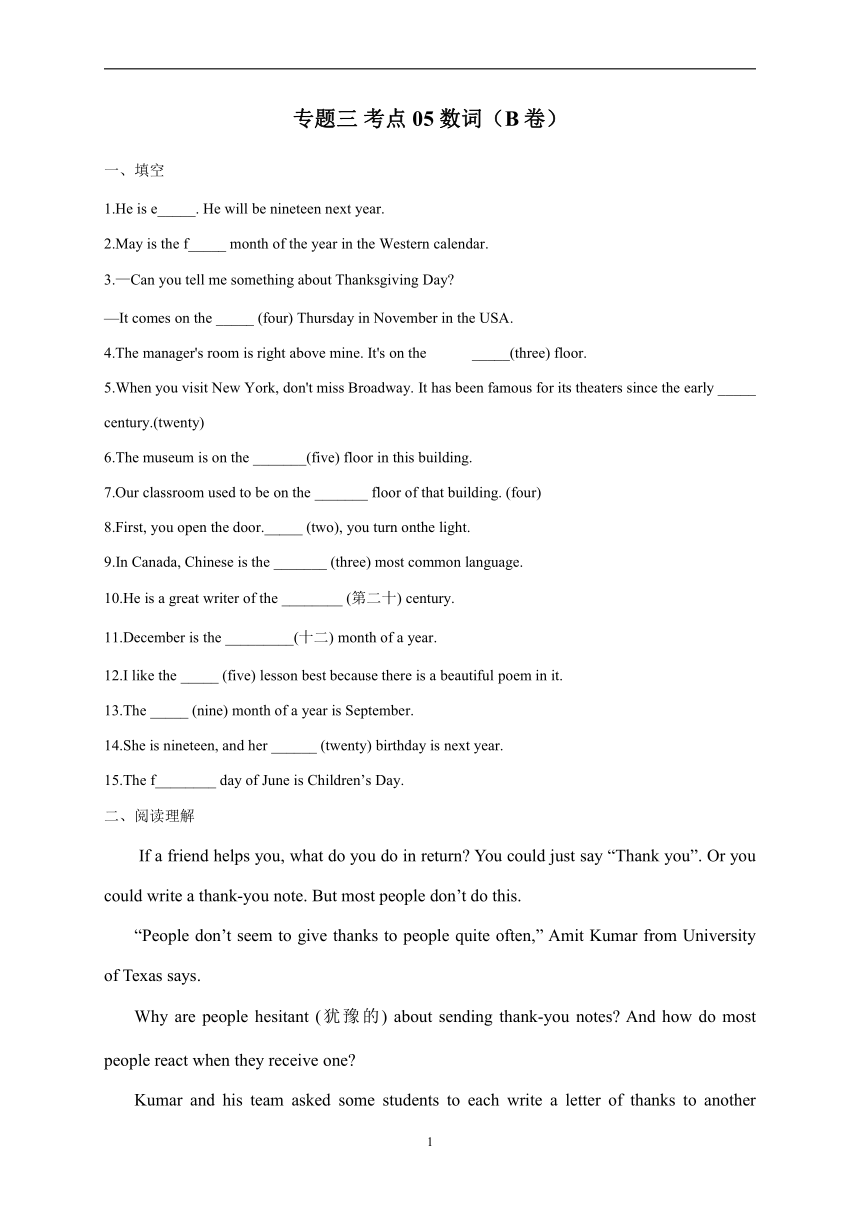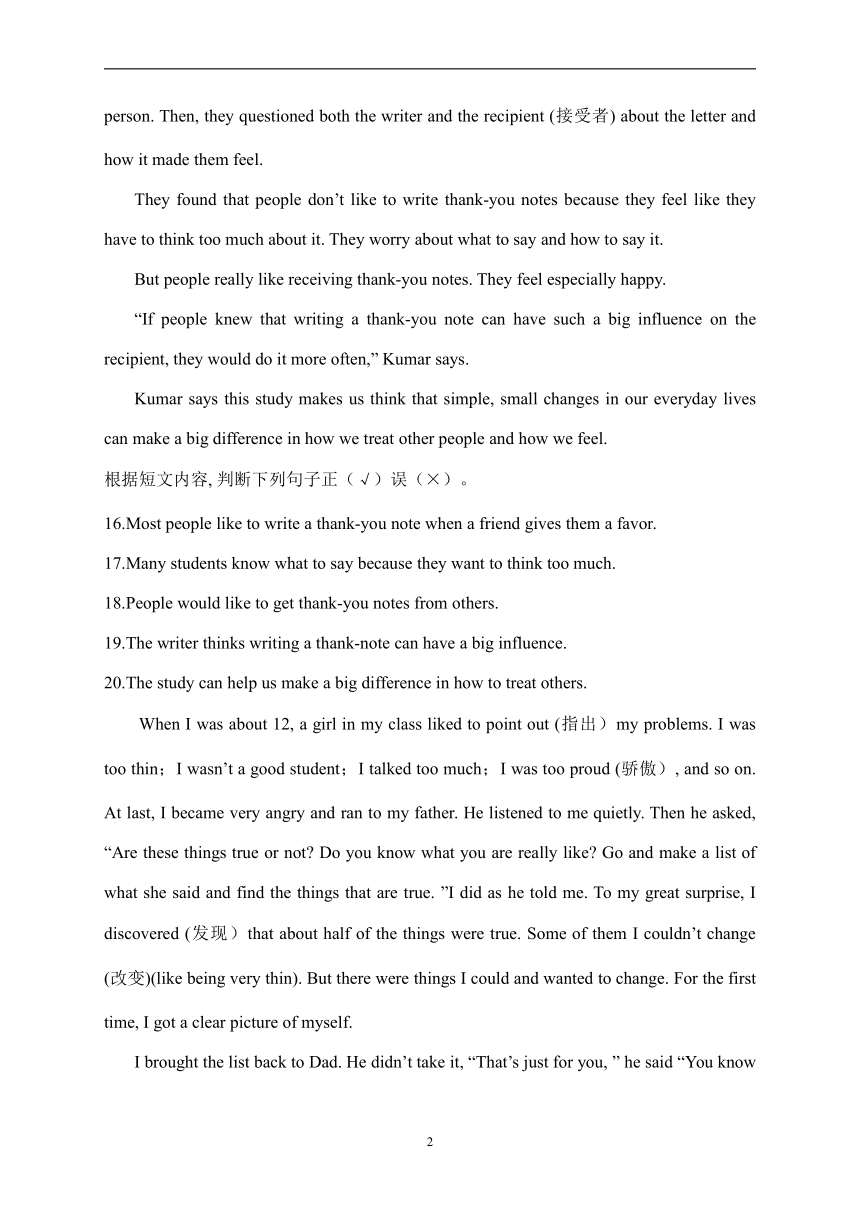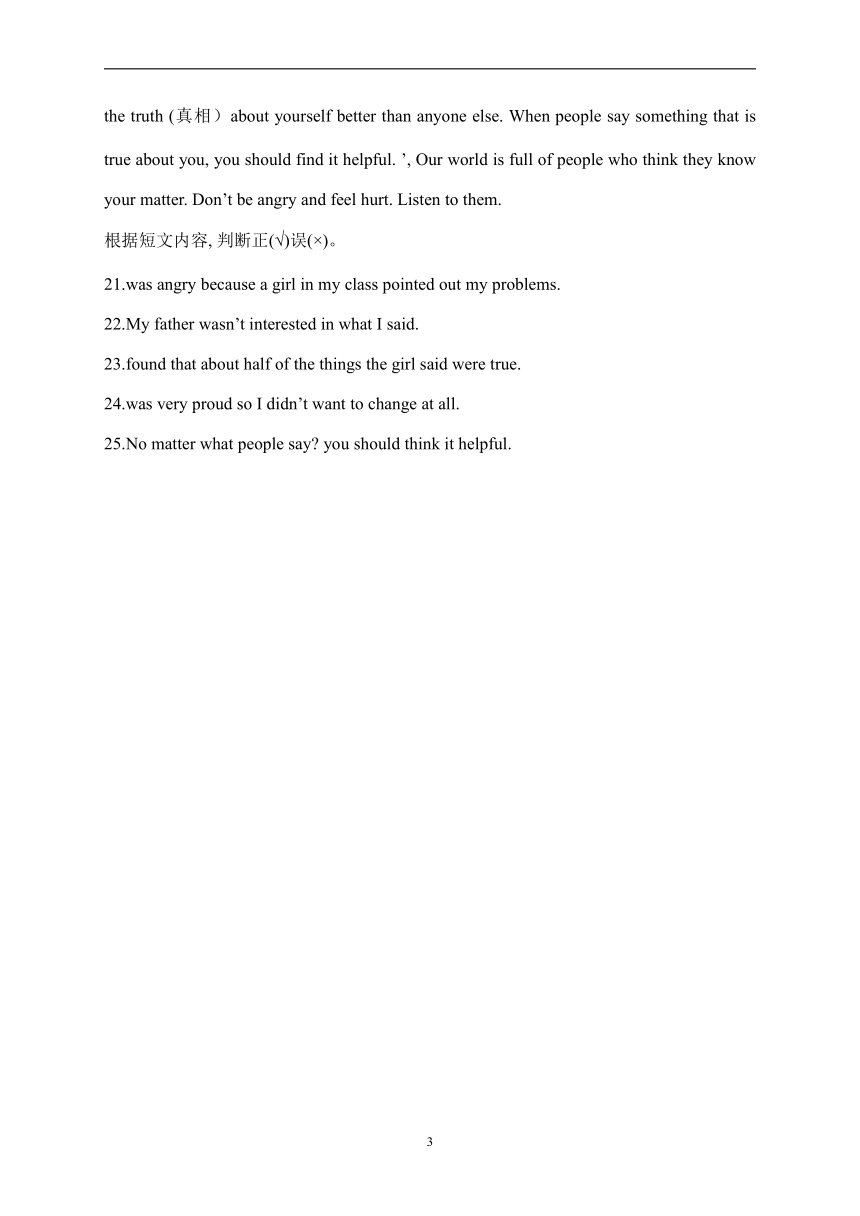2023届中考英语高频考点专项练习:专题三 考点05 数词(B卷)(含答案)
文档属性
| 名称 | 2023届中考英语高频考点专项练习:专题三 考点05 数词(B卷)(含答案) |  | |
| 格式 | docx | ||
| 文件大小 | 23.6KB | ||
| 资源类型 | 教案 | ||
| 版本资源 | 通用版 | ||
| 科目 | 英语 | ||
| 更新时间 | 2022-12-16 09:20:15 | ||
图片预览



文档简介
专题三 考点05 数词(B卷)
一、填空
1.He is e_____. He will be nineteen next year.
2.May is the f_____ month of the year in the Western calendar.
3.—Can you tell me something about Thanksgiving Day
—It comes on the _____ (four) Thursday in November in the USA.
4.The manager's room is right above mine. It's on the _____(three) floor.
5.When you visit New York, don't miss Broadway. It has been famous for its theaters since the early _____ century.(twenty)
6.The museum is on the _______(five) floor in this building.
7.Our classroom used to be on the _______ floor of that building. (four)
8.First, you open the door._____ (two), you turn onthe light.
9.In Canada, Chinese is the _______ (three) most common language.
10.He is a great writer of the ________ (第二十) century.
11.December is the _________(十二) month of a year.
12.I like the _____ (five) lesson best because there is a beautiful poem in it.
13.The _____ (nine) month of a year is September.
14.She is nineteen, and her ______ (twenty) birthday is next year.
15.The f________ day of June is Children’s Day.
二、阅读理解
If a friend helps you, what do you do in return You could just say “Thank you”. Or you could write a thank-you note. But most people don’t do this.
“People don’t seem to give thanks to people quite often,” Amit Kumar from University of Texas says.
Why are people hesitant (犹豫的) about sending thank-you notes And how do most people react when they receive one
Kumar and his team asked some students to each write a letter of thanks to another person. Then, they questioned both the writer and the recipient (接受者) about the letter and how it made them feel.
They found that people don’t like to write thank-you notes because they feel like they have to think too much about it. They worry about what to say and how to say it.
But people really like receiving thank-you notes. They feel especially happy.
“If people knew that writing a thank-you note can have such a big influence on the recipient, they would do it more often,” Kumar says.
Kumar says this study makes us think that simple, small changes in our everyday lives can make a big difference in how we treat other people and how we feel.
根据短文内容, 判断下列句子正(√)误(×)。
16.Most people like to write a thank-you note when a friend gives them a favor.
17.Many students know what to say because they want to think too much.
18.People would like to get thank-you notes from others.
19.The writer thinks writing a thank-note can have a big influence.
20.The study can help us make a big difference in how to treat others.
When I was about 12, a girl in my class liked to point out (指出)my problems. I was too thin;I wasn’t a good student;I talked too much;I was too proud (骄傲), and so on. At last, I became very angry and ran to my father. He listened to me quietly. Then he asked, “Are these things true or not Do you know what you are really like Go and make a list of what she said and find the things that are true. ”I did as he told me. To my great surprise, I discovered (发现)that about half of the things were true. Some of them I couldn’t change (改变)(like being very thin). But there were things I could and wanted to change. For the first time, I got a clear picture of myself.
I brought the list back to Dad. He didn’t take it, “That’s just for you, ” he said “You know the truth (真相)about yourself better than anyone else. When people say something that is true about you, you should find it helpful. ’, Our world is full of people who think they know your matter. Don’t be angry and feel hurt. Listen to them.
根据短文内容, 判断正(√)误(×)。
21.was angry because a girl in my class pointed out my problems.
22.My father wasn’t interested in what I said.
23.found that about half of the things the girl said were true.
24.was very proud so I didn’t want to change at all.
25.No matter what people say you should think it helpful.
答案以及解析
1.答案:eighteen
2.答案:fifth
解析:考查句意理解和数词运用。句意:在西方日历上,五月是一年的第五个月。由此可知,此处使用序数词"fifth(第五)"。
3.答案:fourth
解析:在美国,感恩节在十一月的第四个星期四。
4.答案:third
解析:考查序数词。句意:经理办公室就在我所在的办公室上面。表示在几层,应该使用序数词。
5.答案:twentieth
6.答案:fifth
解析:表示"第几"常用序数词,five的序数词形式是fifth。
7.答案:fourth/4th
8.答案:Second
解析:根据First可知此处用second; 设空位于句首,首字母应大写,故填Second。
9.答案:third
解析:句意:在加拿大,中文是第三大通用语言。分析语境可知,空处数词表示某个范围的"第几",因此用three对应的序数词。
10.答案:twentieth
11.答案:twelfth
12.答案:fifth
解析:句意为:我最喜欢第五课,因为里面有一首优美的诗。根据the...lesson可知此处表示第五节课,所以要用序数词表顺序。故填fifth。
13.答案:ninth
解析:句意为:一年的第九个月是九月。序数词ninth意为“第九”,符合语境,故填ninth。
14.答案:twentieth
解析:句意为:她现在十九岁,她的二十岁生日在 明年。twenty的序数词是twentieth。故填twentieth。
15.答案:(f)irst
16.答案:×
解析:细节理解题。由短文第一段最后两句“But most people don’t do this.”可知大多数人不愿意写感谢信。该表述与文章内容不符。故答案为×。
17.答案:×
解析:细节理解题。由第五段内容“They found that people don’t like to write thank-you notes because they feel like they have to think too much about it.”可知, 他们发现人们不喜欢写感谢信, 因为他们觉得自己不得不考虑太多。而且他们也担心说什么和怎么说。该表述与文章内容不符。故答案为×。
18.答案:√
解析:细节理解题。由短文第六段内容“But people really like receiving thank-you notes.”可知, 人们真的很喜欢收到感谢信。该表述与文章内容相符。故答案为√。
19.答案:√
解析:细节理解题。由短文第七段内容“If people knew that writing a thank-you note can have such a big influence on the recipient...”可知感谢信能产生巨大的影响。该表述与文章内容相符。故答案为√。
20.答案:√
解析:细节理解题。由短文最后一段“...can make a big difference in how we treat other people and how we feel.”可推断, 作者认为这项调查可以帮助我们在如何对待他人方面做出很大的改变。该表述与文章内容相符。故答案为√。
21.答案:√
解析:根据 At last, I became very angry and ran to my father.可知当我班里的一个女孩指出我的许多毛病时, 我生气了。因此此处与文中意思相符, 故为√。
22.答案:×
解析:根据He listened to me quietly可知父亲安静地听我说, 因此父亲对我说的内容感兴趣, 故此处与文中意思不相符, 故为×。
23.答案:√
解析:根据I discovered (发现)that about half of the things were true.可知我发现那个女孩所说的事中有一半是真实的, 因此此处与文中意思相符, 故为√。
24.答案:×
解析:根据But there were things I could and wanted to change.可知有一些事是我能而且想改变的, 故此处与文中意思不相符, 故为×。
25.答案:×
解析:根据When people say something that is true about you, you should find it helpful. 可知当人们说的是你的真实情况, 而不是任何事情, 你应该认为这是有帮助的, 故此处与文中意思不相符, 故为×。
2
一、填空
1.He is e_____. He will be nineteen next year.
2.May is the f_____ month of the year in the Western calendar.
3.—Can you tell me something about Thanksgiving Day
—It comes on the _____ (four) Thursday in November in the USA.
4.The manager's room is right above mine. It's on the _____(three) floor.
5.When you visit New York, don't miss Broadway. It has been famous for its theaters since the early _____ century.(twenty)
6.The museum is on the _______(five) floor in this building.
7.Our classroom used to be on the _______ floor of that building. (four)
8.First, you open the door._____ (two), you turn onthe light.
9.In Canada, Chinese is the _______ (three) most common language.
10.He is a great writer of the ________ (第二十) century.
11.December is the _________(十二) month of a year.
12.I like the _____ (five) lesson best because there is a beautiful poem in it.
13.The _____ (nine) month of a year is September.
14.She is nineteen, and her ______ (twenty) birthday is next year.
15.The f________ day of June is Children’s Day.
二、阅读理解
If a friend helps you, what do you do in return You could just say “Thank you”. Or you could write a thank-you note. But most people don’t do this.
“People don’t seem to give thanks to people quite often,” Amit Kumar from University of Texas says.
Why are people hesitant (犹豫的) about sending thank-you notes And how do most people react when they receive one
Kumar and his team asked some students to each write a letter of thanks to another person. Then, they questioned both the writer and the recipient (接受者) about the letter and how it made them feel.
They found that people don’t like to write thank-you notes because they feel like they have to think too much about it. They worry about what to say and how to say it.
But people really like receiving thank-you notes. They feel especially happy.
“If people knew that writing a thank-you note can have such a big influence on the recipient, they would do it more often,” Kumar says.
Kumar says this study makes us think that simple, small changes in our everyday lives can make a big difference in how we treat other people and how we feel.
根据短文内容, 判断下列句子正(√)误(×)。
16.Most people like to write a thank-you note when a friend gives them a favor.
17.Many students know what to say because they want to think too much.
18.People would like to get thank-you notes from others.
19.The writer thinks writing a thank-note can have a big influence.
20.The study can help us make a big difference in how to treat others.
When I was about 12, a girl in my class liked to point out (指出)my problems. I was too thin;I wasn’t a good student;I talked too much;I was too proud (骄傲), and so on. At last, I became very angry and ran to my father. He listened to me quietly. Then he asked, “Are these things true or not Do you know what you are really like Go and make a list of what she said and find the things that are true. ”I did as he told me. To my great surprise, I discovered (发现)that about half of the things were true. Some of them I couldn’t change (改变)(like being very thin). But there were things I could and wanted to change. For the first time, I got a clear picture of myself.
I brought the list back to Dad. He didn’t take it, “That’s just for you, ” he said “You know the truth (真相)about yourself better than anyone else. When people say something that is true about you, you should find it helpful. ’, Our world is full of people who think they know your matter. Don’t be angry and feel hurt. Listen to them.
根据短文内容, 判断正(√)误(×)。
21.was angry because a girl in my class pointed out my problems.
22.My father wasn’t interested in what I said.
23.found that about half of the things the girl said were true.
24.was very proud so I didn’t want to change at all.
25.No matter what people say you should think it helpful.
答案以及解析
1.答案:eighteen
2.答案:fifth
解析:考查句意理解和数词运用。句意:在西方日历上,五月是一年的第五个月。由此可知,此处使用序数词"fifth(第五)"。
3.答案:fourth
解析:在美国,感恩节在十一月的第四个星期四。
4.答案:third
解析:考查序数词。句意:经理办公室就在我所在的办公室上面。表示在几层,应该使用序数词。
5.答案:twentieth
6.答案:fifth
解析:表示"第几"常用序数词,five的序数词形式是fifth。
7.答案:fourth/4th
8.答案:Second
解析:根据First可知此处用second; 设空位于句首,首字母应大写,故填Second。
9.答案:third
解析:句意:在加拿大,中文是第三大通用语言。分析语境可知,空处数词表示某个范围的"第几",因此用three对应的序数词。
10.答案:twentieth
11.答案:twelfth
12.答案:fifth
解析:句意为:我最喜欢第五课,因为里面有一首优美的诗。根据the...lesson可知此处表示第五节课,所以要用序数词表顺序。故填fifth。
13.答案:ninth
解析:句意为:一年的第九个月是九月。序数词ninth意为“第九”,符合语境,故填ninth。
14.答案:twentieth
解析:句意为:她现在十九岁,她的二十岁生日在 明年。twenty的序数词是twentieth。故填twentieth。
15.答案:(f)irst
16.答案:×
解析:细节理解题。由短文第一段最后两句“But most people don’t do this.”可知大多数人不愿意写感谢信。该表述与文章内容不符。故答案为×。
17.答案:×
解析:细节理解题。由第五段内容“They found that people don’t like to write thank-you notes because they feel like they have to think too much about it.”可知, 他们发现人们不喜欢写感谢信, 因为他们觉得自己不得不考虑太多。而且他们也担心说什么和怎么说。该表述与文章内容不符。故答案为×。
18.答案:√
解析:细节理解题。由短文第六段内容“But people really like receiving thank-you notes.”可知, 人们真的很喜欢收到感谢信。该表述与文章内容相符。故答案为√。
19.答案:√
解析:细节理解题。由短文第七段内容“If people knew that writing a thank-you note can have such a big influence on the recipient...”可知感谢信能产生巨大的影响。该表述与文章内容相符。故答案为√。
20.答案:√
解析:细节理解题。由短文最后一段“...can make a big difference in how we treat other people and how we feel.”可推断, 作者认为这项调查可以帮助我们在如何对待他人方面做出很大的改变。该表述与文章内容相符。故答案为√。
21.答案:√
解析:根据 At last, I became very angry and ran to my father.可知当我班里的一个女孩指出我的许多毛病时, 我生气了。因此此处与文中意思相符, 故为√。
22.答案:×
解析:根据He listened to me quietly可知父亲安静地听我说, 因此父亲对我说的内容感兴趣, 故此处与文中意思不相符, 故为×。
23.答案:√
解析:根据I discovered (发现)that about half of the things were true.可知我发现那个女孩所说的事中有一半是真实的, 因此此处与文中意思相符, 故为√。
24.答案:×
解析:根据But there were things I could and wanted to change.可知有一些事是我能而且想改变的, 故此处与文中意思不相符, 故为×。
25.答案:×
解析:根据When people say something that is true about you, you should find it helpful. 可知当人们说的是你的真实情况, 而不是任何事情, 你应该认为这是有帮助的, 故此处与文中意思不相符, 故为×。
2
同课章节目录
- 词法
- 名词
- 动词和动词短语
- 动词语态
- 动词时态
- 助动词和情态动词
- 非谓语动词
- 冠词
- 代词
- 数词和量词
- 形容词副词及其比较等级
- 介词和介词短语
- 连词和感叹词
- 构词法
- 相似、相近词比较
- 句法
- 陈述句
- 一般疑问句和否定疑问句
- 特殊疑问句及选择疑问句
- 反意疑问句
- 存在句(There be句型)
- 宾语从句
- 定语从句
- 状语从句
- 主谓一致问题
- 简单句
- 并列句
- 复合句
- 主谓一致
- 主、表语从句
- 名词性从句
- 直接引语和间接引语
- 虚拟语气
- 感叹句
- 强调句
- 倒装句
- 祈使句
- 句子的成分
- 句子的分类
- 题型专区
- 单项选择部分
- 易错题
- 完形填空
- 阅读理解
- 词汇练习
- 听说训练
- 句型转换
- 补全对话
- 短文改错
- 翻译
- 书面表达
- 任务型阅读
- 语法填空
- 其他资料
